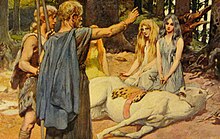Germanic paganism: Difference between revisions
Appearance
Content deleted Content added
why is a new religious movement template atop an ancient religion article? |
m because this ancient religion is a direct ancestor of this nrm |
||
| Line 1: | Line 1: | ||
{{Expand Danish|Germansk religion|date=February 2018}} |
{{Expand Danish|Germansk religion|date=February 2018}} |
||
{{Heathenry}} |
|||
[[File:Wodan_heilt_Balders_Pferd_by_Emil_Doepler.jpg|thumb|[[Emil Doepler]]'s depiction of the [[Merseburg charms#Second Merseburg Charm|Second Merseburg Charm]], 1905. In the charm, gods from continental Germanic mythology heal a horse.]] |
[[File:Wodan_heilt_Balders_Pferd_by_Emil_Doepler.jpg|thumb|[[Emil Doepler]]'s depiction of the [[Merseburg charms#Second Merseburg Charm|Second Merseburg Charm]], 1905. In the charm, gods from continental Germanic mythology heal a horse.]] |
||
Revision as of 17:48, 7 April 2019
You can help expand this article with text translated from the corresponding article in Danish. (February 2018) Click [show] for important translation instructions.
|
| Part of a series on |
| Heathenry |
|---|
 |
| Modern paganism |

Germanic paganism refers to the indigenous religion of the Germanic people from the Iron Age until Christianisation during the Middle Ages. Rooted in Proto-Indo-European religion, Proto-Germanic religion expanded during the Migration Period, yielding extensions such as Old Norse religion among the North Germanic peoples, Continental Germanic paganism among the continental Germanic peoples, and Anglo-Saxon paganism among the West Germanic people. Among the East Germanic peoples, traces of Gothic paganism may be discerned from scant artifacts and attestations. According to John Thor Ewing, as a religion it consisted of "individual worshippers, family traditions and regional cults within a broadly consistent framework".[1]
Variations of Germanic paganism
See also
References
- ^ Ewing, Thor (2008). Gods and Worshippers in the Viking and Germanic World. Tempus. p. 9.
Further reading
- Grimm, Jacob (2004), Teutonic Mythology, translated by Stallybrass, James S., Dover Publications
- Buchholz, Peter (1968), "Perspectives for Historical Research in Germanic Religion", History of Religions, 8 (2), University of Chicago Press: 111–138
- North, Richard (1991), Pagan words and Christian meanings, Rodopi, ISBN 978-90-5183-305-8
